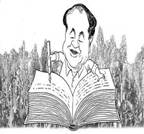题目内容
He ________ much money ________ books and tapes.
- A.spends, in
- B.takes, on
- C.took, on
- D.spent, on

 阅读快车系列答案
阅读快车系列答案
Born into a farmer’s family, life was not easy when I was a kid. We were so poor that we often did not know where our next meal was coming from. I had to sell cabbages at the marketplace to support my family.
A storyteller once came to the marketplace, and I went to listen to him. My mother was unhappy with me for forgetting my job. But that night, while she was making clothes for us under the weak light of an oil lamp, I couldn't help retelling stories I'd heard that day. She listened impatiently at first, since in her eyes professional(职业的) storytellers were smooth-talking men—nothing good ever came out of their mouths. But slowly she was attracted by my retold stories, and from that day on, she never gave me any task on market days, unspoken agreement to enjoy new stories. As a repayment(回报)for Mother's kindness and a way to show off my memory, I'd retell the stories for her in lively detail. Soon, she wasn't the only member of my audience, which later included my elder sisters, my aunts, even my stubborn grandmother.
I knew she was worried about me. Talkative kids are not well thought of in our village, for they can bring trouble to themselves and to their families when they talk too much. Mother often reminded me not to talk so much, wanting me to be a silent and modest teenager. However, my natural desire(渴望)to talk never went away, and that is what makes my name – Mo Yan, which means ‘no speaking’. This strong wish to talk also improved my ability to express myself, which is important for writers who are also considered as storytellers.
【小题1】Mo Yan lived a/an ________ life when he was young.
| A.hard | B.colourful | C.easy | D.rich |
| A.little Mo Yan was interested in selling vegetables |
| B.his mother was attracted by the retold story at first |
| C.his mother didn’t let him listen to the new stories again |
| D.little Mo Yan had quite a good memory |
| A.Because she thought they never said anything good. |
| B.Because she thought they couldn’t make much money. |
| C.Because she thought they would affect Mo Yan’s schoolwork. |
| D.Because she thought most people didn’t like listening to stories. |
| A.silent | B.modest | C.talkative | D.trouble-making |
| A.My Unlucky Childhood | B.A Storyteller’s Childhood |
| C.My Kind Grandmother | D.More talking leads to success |
Mo, the first Nobel winner in literature born and living in China, said he had trouble with the sudden publicity, which put a lot of pressure on him.
"I only hope to return to my writing desk as soon as possible, and I would also like to do well in society anonymously.(无名地)" Mo said. He was bothered by a large number of requests asking him to offer help that took advantage of his fame. " I was upset the first several days after the prize announcement, but then I realized the prize is just like a mirror that reflects various attitudes about my winning, and more, reflects the real me," Mo said. "I still consider myself an ordinary citizen who writes. And presenting quality works is my duty and best way of giving back to society. I'm no superstar," he emphasized(强调) several times.
Mo believes Chinese literature has achieved much in the past thirty years, and the driving force behind that is not the prize. Writers' creations should not be driven by awards, or criticism, or readers' expectations. Mo said he misunderstood the standards of the academy's selection before he visited Stockholm(斯德哥尔摩) to receive the prize in December.
"I thought they were judging the authors' personality or political features, then I learned the sole standard of their selection is literature itself, which is also deeply based in the Swedish people's long-established practice of reading a large number of books," Mo said.
During the forum, established Chinese and Australian writers discussed subjects as diverse as tradition and modernity, the local and the universe and cultural inclusiveness. And they will also read works to each other and the readers. The writers communication will further promote(推动) Chinese writers to a global audience.
Australian Ambassador(大使) to China Frances Adamson agreed. "It's a milestone (驱动)of literary exchanges between the two countries, who are longtime friends," Adamson said.
【小题1】 Mo is the first Nobel winner in ______ born and living in China.
| A.literature. | B.peace | C.physics | D.chemistry |
| A.In September | B.In October | C.In November | D.In December |
| A.He considered he was a superstar. |
| B.He still considered he was an ordinary citizen who writes. |
| C.He considered he was famous all over the world. |
| D.He considered he became rich. |
| A.He is the French Ambassador to China | B.He is the Canadian Ambassador to China |
| C.He is the Australian Ambassador to China | D.He is the American Ambassador to China |
| A.Mo didn’t hope to return to my writing desk | B.Mo was always upset after the prize . |
| C.The driving force behind writers is the prize | D.Mo’s success will promote Chinese writers. |
